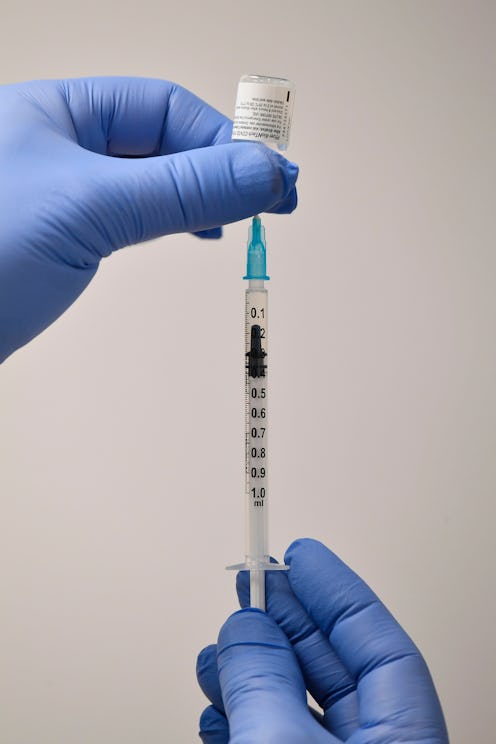Health
Doctors Explain Why You Need 2 Doses Of The COVID Vaccine
Send yourself a cal invite.

Getting the COVID-19 jab is going to be a one-two punch. Both Pfizer and Moderna's COVID-19 vaccines require two doses, the second administered three to four weeks after the first. Other vaccine front runners that use different technology will also require two doses. This may seem like an excessive hassle to you — not one, but two chances to get a prick in the arm — but experts tell Bustle it's been designed to make the vaccine as effective as possible.
"The general concept is that the first dose primes the immune system and the second dose boosts it to give high level protection," infectious disease expert Dr. John A. Sellick D.O., professor of medicine at the Jacobs School of Medicine & Biomedical Sciences at the University of Buffalo, tells Bustle. Pfizer and Moderna's vaccines use genetic material, or mRNA, to replicate a key protein in the coronavirus, training the body to produce antibodies that will fight COVID off. The first dose begins that training process, and the second dose solidifies it.
Multi-dose vaccines have been around for a while, though the mRNA technology Pfizer and Moderna are using is new. Hepatitis B vaccines have two doses, for example, while the HPV vaccines have three. Dr. Kelly Moore M.D. M.P.H. of the Immunization Action Coalition, an organization working to improve vaccination rates, told the Washington Post that two- or three-dose vaccines are basically jogging your immune system's memory.The first dose educates your immune cells about producing the right antibodies, but that lesson might not stick; without the follow-up the immune system may start to forget it.
The second dose reminds your immune cells of what to do, and they'll start producing stronger antibodies that provide long-term protection. Think of it as taking an intensive French course with the first jab, and becoming fluent with the second. La science des vaccins est très intéressante, non?
The first dose primes the immune system and the second dose boosts it.
But why do these require two doses when your flu vaccine, say, just has one? Dr. Sellick explains that pharmaceutical companies checked the most effective way to give lasting immunity to COVID-19 in their Phase I and II vaccine trials, which test out various configurations of doses before a final vaccine is given to humans in Phase III. Pfizer, Moderna, and Astra-Zeneca, a third leading vaccine candidate, have decided to produce vaccines with two doses based on these tests, because they seem to provide the best immune response. The New York Times reports that Johnson & Johnson, which is still testing its vaccines, has designed two trials, one of a single dose and one of two, to see which method might be most effective.
That's why you really, really shouldn't skip that follow up shot once you're in the queue to get yours. "The efficacy of the vaccine is less after a single shot," Lori Post, Ph.D., director of Northwestern's Buehler Center for Health Policy and Economics at the Institute for Public Health and Medicine, tells Bustle. A study published in The New England Journal Of Medicine in December found that the Pfizer vaccine is only 52% protective after one dose. It takes the second dose for it to become 91% protective, and one week after that second jab, the vaccine becomes 95% effective. Post adds that the duration of the protection granted by one shot of the Pfizer or Moderna vaccine is probably less than the protection afforded by two shots — but that scientists need more data to know for sure.
If you miss your second dose appointment, you can still get it a bit later. “The second dose can be picked up at any time after the first. No need to start the series over,” Dr. Paul Offit M.D., Director of the Vaccine Education Center and a member of the F.D.A.’s vaccine advisory panel, told The New York Times in December. But it's better to be safe than sorry — so when you've had your first jab, set all the reminders on your phone, put up Post-Its, anything you can to make sure you get your second dose in a timely manner.
Experts:
Lori Post Ph.D.
Dr. John A. Sellick D.O.
Studies cited:
Polack, F. P., Thomas, S. J., Kitchin, N., Absalon, J., Gurtman, A., Lockhart, S., Perez, J. L., Pérez Marc, G., Moreira, E. D., Zerbini, C., Bailey, R., Swanson, K. A., Roychoudhury, S., Koury, K., Li, P., Kalina, W. V., Cooper, D., Frenck, R. W., Jr, Hammitt, L. L., Türeci, Ö., … C4591001 Clinical Trial Group (2020). Safety and Efficacy of the BNT162b2 mRNA Covid-19 Vaccine. The New England journal of medicine, 10.1056/NEJMoa2034577. Advance online publication. https://doi.org/10.1056/NEJMoa2034577
Ratajczak, W., Niedźwiedzka-Rystwej, P., Tokarz-Deptuła, B., & Deptuła, W. (2018). Immunological memory cells. Central-European journal of immunology, 43(2), 194–203. https://doi.org/10.5114/ceji.2018.77390
This article was originally published on